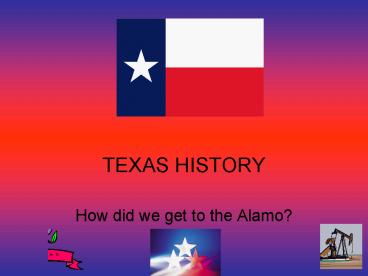TEXAS HISTORY - PowerPoint PPT Presentation
1 / 14
Title: TEXAS HISTORY
1
TEXAS HISTORY
- How did we get to the Alamo?
2
About 12,000 years ago, people first land in the
Western Hemisphere.
3
About 11,000 years ago, early Native
Americans reach Texas. (Remember that Texas was
not named Texas at that time. The land they
arrived on was unclaimed at that time.)
4
Indian Tribes
- Caddos, Karankwas, Coahuiltecans, Tonkawas, Lipan
Apaches, Comanches, Kiowas, Pueblos, Jumanos,
Conchos, and Tiguas were some of the tribes that
inhabited Texas. Some were hunters and gatherers
and some were farmers, depending on how they
could meet their needs.
5
1582 Europeans Arrive Spain wished to make the
lands of present day Mexico and southwestern US
theirs.
6
Spanish Explorers
- The first explorer Spain sent was Alvarez de
Pineda. He sailed along the coasts of Florida,
Alabama, Louisiana, Texas, and Mexico and then
reported to Spain. - In 1528, Spain sent Panfilo de Narvaez to claim
all the lands along the Gulf of Mexico for Spain.
7
Narvaez
- He led an expedition to Florida . He and his crew
of 300 got stranded on the coast of Florida.
They built rafts and tried to leave but disaster
struck. A storm wrecked their rafts and only 80
crew members survived. Only 4 of them would
reach Mexico. (Alvar Nunez Cabeza de Vaca, Alonso
Castillo Maldonado, Andres Dorantes de Carranza
and a n African slave Estaban. Cabeza de Vaco
soon became separated. He and the other
survivors learned much about the Native
Americans and heard many legends. One was about
a city of gold called Cibola. - They spent seven difficult years in Texas. They
- were sick, had little food, and were enslaved by
the - Karankawas. They later escaped and reached
- Mexico.
8
City of Gold
In 1529 Spain sent a small group of explorers
from Mexico to search for Cibola. They consisted
of soldiers, a priest, Marco de Niza and Esteban.
The mission was unsuccessful. In 1540 Spain
sent another expedition in search of Cibola.
Francisco Vasquez de Coronado led the way. They
found a Pueblo, but there was not any gold.
They decided to continue traveling. They met an
Indian who told them of a place called Quivira, a
land of riches. After traveling for months and
months, they reached Quivira, in the center of
what is today Kansas. It turned out to be an
ordinary Indian village. How do you think this
myth got started? What could the scientific
explanation be??
9
Juan de Onate
- Onate led an expedition to the lands north of
Mexico in 1598. He too was unsuccessful in
finding gold. However he did name the place we
now call El Paso, El Paso del Norte which means
pass to the north. Spain did not send any more
expeditions to Texas for 75 years.
10
France Stakes A Claim
- In 1682 France sent explorer Robert Cavelier,
known as Sieur de La Salle, down the Mississippi
River to the Gulf of Mexico, claiming land for
France along the way. - In 1685 he started a colony in present day Texas
called Fort St. Louis. (Between Galveston and
Corpus Christi.)
11
La Salles Colony
- Problems at the colony
- 1. Crops did not grow well.
- 2. Settlers became sick and died.
- 3. Karankawas attacked.
- Settlers blamed La Salle for these problems and
ended up killing him
12
Spain gets angry!
- When Spain found out that France was trying to
settle on land it had claimed, they sent soldiers
to for the French to leave. They did not want
their lands settled by other countries. By the
time the Spanish reached Fort St. Louis, it had
already been destroyed.
13
Spain Has a Plan
- Even though Fort St. Louis was destroyed, Spain
still worried that other countries may try to
settle on their lands. So they decided to build
missions, or religious settlements to try and
watch over their lands.
14
Missions
- By 1750, there were more than 20 Spanish missions
in Texas. They were run by Catholic priests.
Most were built near Indian villages, in hopes to
convert the Indians. - Missions had
- 1. walls surrounding them for protection
- 2. houses, school, church, and workplaces
- 3. most had farms and ranches































